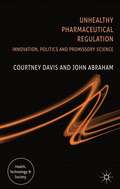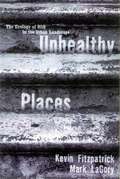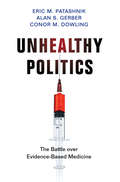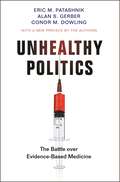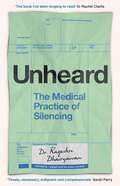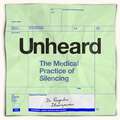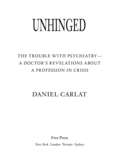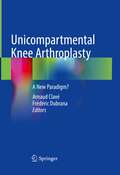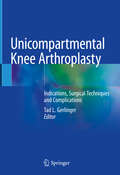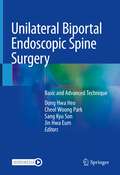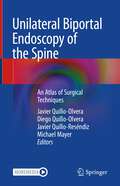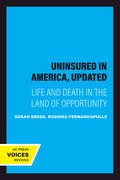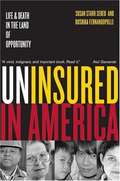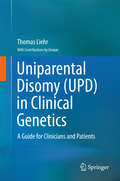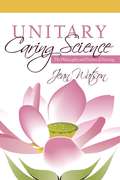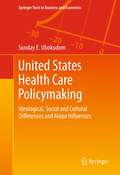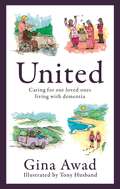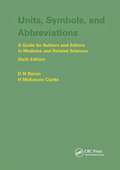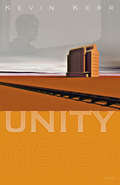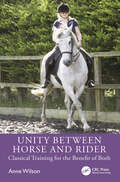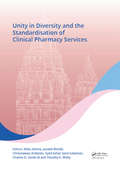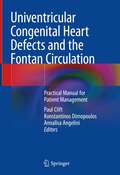- Table View
- List View
Unhealthy Pharmaceutical Regulation
by Courtney Davis John AbrahamEuropean and American drug regulators govern a multi-billion-dollar pharmaceutical industry selling its products on the world's two largest medicines markets. This is the first book to investigate how effectively American and supranational EU governments have regulated innovative pharmaceuticals regarding public health during the neo-liberal era of the last 30 years. Drawing on years of fieldwork, the authors demonstrate that pharmaceutical regulation and innovation have been misdirected by commercial interests and misconceived ideologies, which induced a deregulatory political culture contrary to health interests. They dismantle the myth that pharmaceutical innovations necessarily equate with therapeutic advances and explain how it has been perpetuated in the interests of industry by corporate bias within the regulatory state, unwarranted expectations of promissory science, and the emergent patient-industry complex. Endemic across both continents, the misadventures of pharmaceutical deregulation are shown to span many therapeutic areas, including cancer, diabetes and irritable bowel syndrome. The authors propose political changes needed to redirect pharmaceutical regulation in the interests of health.
Unhealthy Places: The Ecology of Risk in the Urban Landscape
by Kevin Fitzpatrick Mark LagoryAn awakening argument on modern day health hazards and how they are directly proportional to the unhealthiness of urban environment.
Unhealthy Politics: The Battle over Evidence-Based Medicine
by Eric M. Patashnik Alan S. Gerber Conor M. DowlingHow partisanship, polarization, and medical authority stand in the way of evidence-based medicineThe U.S. medical system is touted as the most advanced in the world, yet many common treatments are not based on sound science. Treatments can go into widespread use before they are rigorously evaluated, and every year patients are harmed because they receive too many procedures—and too few treatments that really work. Unhealthy Politics sheds new light on why the government’s response to this troubling situation has been so inadequate, and why efforts to improve the evidence base of U.S. medicine continue to cause so much political controversy and public trepidation.This critically important book draws on public opinion surveys, physician surveys, case studies, and political science models to explain how political incentives, polarization, and the misuse of professional authority have undermined efforts to tackle the medical evidence problem and curb wasteful spending. It paints a portrait of a medical industry with vast influence over which procedures and treatments get adopted, and a public burdened by the rising costs of health care yet fearful of going against “doctor’s orders.” The book shows how the government’s efforts to promote evidence-based medicine have become mired in partisan debates. It also proposes sensible solutions that can lead to better, more efficient health care for all of us.Unhealthy Politics offers vital insights not only into health policy but also into the limits of science, expertise, and professionalism as political foundations for pragmatic problem solving in American democracy.
Unhealthy Politics: The Battle over Evidence-Based Medicine
by Eric M. Patashnik Alan S. Gerber Conor M. DowlingHow partisanship, polarization, and medical authority stand in the way of evidence-based medicineThe U.S. medical system is touted as the most advanced in the world, yet many common treatments are not based on sound science. Unhealthy Politics sheds new light on why the government's response to this troubling situation has been so inadequate, and why efforts to improve the evidence base of U.S. medicine continue to cause so much political controversy. This critically important book paints a portrait of a medical industry with vast influence over which procedures and treatments get adopted, and a public burdened by the rising costs of health care yet fearful of going against "doctor's orders." Now with a new preface by the authors, Unhealthy Politics offers vital insights into the limits of science, expertise, and professionalism in American politics.
Unheard: The Medical Practice of Silencing
by Dr Rageshri DhairyawanHave you ever felt unheard by your doctor? Been frustrated that they haven't understood your symptoms, that they have neglected your concerns?When Dr Rageshri Dhairyawan was admitted to hospital as a patient she didn't receive the pain medication that she told them she needed, despite her being a senior doctor. It was in that moment she understood that something was deeply wrong with our healthcare system. Doctors aren't listening, and it is making us ill.In Unheard, Dr Dhairyawan takes us on a journey through history to show how not listening to patients has been ingrained in medicine from its inception. Western medicine has been built on the assumption that power should always lie with the doctor, and that patients should be powerless to decisions made about their body if it is done to make them well. This, alongside the prejudices of society, has led to dramatic gaps in medical knowledge because for centuries people have not been heard.Dr Dhairyawan offers a way to reshape our health system for a future where active and engaged listening is the new frontier in a timely, shocking and engaging exposé of the medical world.
Unheard: The Medical Practice of Silencing
by Dr Rageshri DhairyawanHave you ever felt unheard by your doctor? Been frustrated that they haven't understood your symptoms, that they have neglected your concerns?When Dr Rageshri Dhairyawan was admitted to hospital as a patient she didn't receive the pain medication that she told them she needed, despite her being a senior doctor. It was in that moment she understood that something was deeply wrong with our healthcare system. Doctors aren't listening, and it is making us ill.In Unheard, Dr Dhairyawan takes us on a journey through history to show how not listening to patients has been ingrained in medicine from its inception. Western medicine has been built on the assumption that power should always lie with the doctor, and that patients should be powerless to decisions made about their body if it is done to make them well. This, alongside the prejudices of society, has led to dramatic gaps in medical knowledge because for centuries people have not been heard.Dr Dhairyawan offers a way to reshape our health system for a future where active and engaged listening is the new frontier in a timely, shocking and engaging exposé of the medical world.
Unhinged: A Doctor's Revelations About a Profession in Crisis
by Daniel CarlatIn this stirring and beautifully written wake-up call, psychiatrist Daniel Carlat exposes deeply disturbing problems plaguing his profession, revealing the ways it has abandoned its essential purpose: to understand the mind, so that psychiatrists can heal mental illness and not just treat symptoms. As he did in his hard-hitting and widely read New York Times Magazine article "Dr. Drug Rep," and as he continues to do in his popular watchdog newsletter, The Carlat Psychiatry Report, he writes with bracing honesty about how psychiatry has so largely forsaken the practice of talk therapy for the seductive and more lucrative practice of simply prescribing drugs, with a host of deeply troubling consequences. Psychiatrists have settled for treating symptoms rather than causes, embracing the apparent medical rigor of DSM diagnoses and prescription in place of learning the more challenging craft of therapeutic counseling, gaining only limited understanding of their patients lives. Talk therapy takes time, whereas the fifteen-minute "med check" allows for more patients and more insurance company reimbursement. Yet DSM diagnoses, he shows, are premised on a good deal less science than we would think. Writing from an insider's perspective, with refreshing forthrightness about his own daily struggles as a practitioner, Dr. Carlat shares a wealth of stories from his own practice and those of others that demonstrate the glaring shortcomings of the standard fifteen-minute patient visit. He also reveals the dangers of rampant diagnoses of bipolar disorder, ADHD, and other "popular" psychiatric disorders, and exposes the risks of the cocktails of medications so many patients are put on. Especially disturbing are the terrible consequences of over-prescription of drugs to children of ever younger ages. Taking us on a tour of the world of pharmaceutical marketing, he also reveals the inner workings of collusion between psychiatrists and drug companies. Concluding with a road map for exactly how the profession should be reformed, Unhinged is vital reading for all those in treatment or considering it, as well as a stirring call to action for the large community of psychiatrists themselves. As physicians and drug companies continue to work together in disquieting and harmful ways, and as diagnoses and misdiagnoses of mental disorders skyrocket, it's essential that Dr. Carlat's bold call for reform is heeded.
Unicompartmental Knee Arthroplasty: A New Paradigm?
by Arnaud Clavé Frédéric DubranaThis timely and practical book presents the state-of-the-art of unicompartmental knee arthroplasty exploring half a century of reflection, reluctance and research around this increasingly common technique.In the opening part readers will discover UKA’s history, controversies as well as standard and emerging indications. Moving forward they will understand the differences between several eligible implants as well as case-by-case guiding principles behind a correct implant choice. Insights into single stage and robotic surgery, rehabilitation, possible complications, return to play and the use of joint registries further complement the book. Written by an international panel of experts, who share best practices and high quality intra-operative pictures, the book will be an excellent resource for practicing knee surgeons, sports physicians, residents and fellows alike.
Unicompartmental Knee Arthroplasty: Indications, Surgical Techniques and Complications
by Tad L. GerlingerUnicompartmental knee arthroplasty (UKA) - also known as unicondylar knee arthroplasty or partial knee replacement - is an excellent surgical option for the treatment of isolated medial, lateral and patellofemoral compartment arthritis of the knee, as long term results suggest high patient satisfaction and survivability that rivals total knee arthroplasty (TKA). These procedures are well-suited for rapid recovery protocols and outpatient surgery through well-structured surgical pathways. With demand increasing for knee arthroplasty, patients presenting sooner and at a younger age, and an ever-increasing interest from patients, surgeons and payors in outpatient surgery, the demand for unicompartmental arthroplasty is expected to increase significantly. This text will assist orthopedic surgeons, sports medicine specialists, residents and attendings in developing successful pathways for unicompartmental knee arthroplasty, divided into three thematic sections. Part one discusses the history, indications and patient selection for UKA, including how to manage patient expectations, as well as implant choices. Surgical techniques for UKA are presented in part two, both the medial and lateral sides, with discussion of mobile bearings, pain management, blood preservation strategies, and therapy options both before and after surgery. Complications and their prevention are presented in part three, including periprosthetic fractures and infection.Timely and practical, Unicompartmental Knee Arthroplasty will provide orthopedic surgeons and related clinical staff with all they need to know to bring this increasingly common technique into practice.
Unilateral Biportal Endoscopic Spine Surgery: Basic and Advanced Technique
by Dong Hwa Heo Cheol Woong Park Sang Kyu Son Jin Hwa EumBiportal endoscopic spine surgery has been rapidly developed recently, and Unilateral biportal endoscopic spine (UBE) surgery may be new stream in spine surgery. UBE surgery is a new concept of surgery that is different from the existing one portal endoscopic surgery, and has the advantage of being familiar with spinal surgeons as the surgical anatomy is similar to a general surgical method, and the learning curve period is short. The 4mm diameter endoscope provides a very clear image, and it can be safely operated under magnified and clear endoscopic view. It is also available to use general surgical instruments in addition to endoscopic surgical instruments during UBE approaches. Currently it is being performed not only in the lumbar spine, but also in the cervical and thoracic spine. In addition, simple laminectomy, disc removal, and spinal fusion are possible. With the advancement of UBE surgery, spinal surgeons from various countries have been performing UBE in recent years, and it is gradually spreading to the world. This will be the first book summarizing from basic to advanced techniques with abundant illustrations and video aid for easy understanding.
Unilateral Biportal Endoscopy of the Spine: An Atlas of Surgical Techniques
by Michael Mayer Javier Quillo-Olvera Diego Quillo-Olvera Javier Quillo-ReséndizEndoscopic spinal surgery has become popular due its procedure-related benefits. The biportal endoscopic surgery is a recent technique, which has gained popularity in Asia, Europe, and Latin America since it can be applied to treat many diseases of the whole spine as cervical, thoracic, lumbar and sacral.Divided into thirty-four chapters, this first-ever book on unilateral biportal endoscopic spine surgery presents the technique history review and its current applications; the currently available technology and basic principles of this surgery: anesthesia, position, and operative room setup; endoscopic instruments, hydrostatic pressure, and intraoperative radiology; as well as anatomical considerations of basic approaches. It also details the techniques to resolve lumbar, cervical and thoracic spine diseases. Written by the world's most influential groups that perform the method, Unilateral Biportal Endoscopy of the Spine: An Atlas of Surgical Techniques will certainly be widely accepted by all surgeons interested to improve their daily practice in minimally invasive spine surgery.
Uninsured in America, Updated: Life and Death in the Land of Opportunity
by Rushika Fernandopulle Susan SeredUninsured in America goes to the heart of why more than forty million Americans are falling through the cracks in the health care system, and what it means for society as a whole when so many people suffer the consequences of inadequate medical care. Based on interviews with 120 uninsured men and women and dozens of medical providers, policymakers, and advocates from around the nation, this book takes a fresh look at one of the most important social issues facing the United States today. A new afterword updates the stories of many of the people who are so memorably presented here.
Uninsured in America: Life and Death in the Land of Opportunity
by Susan Starr Sered Rushika FernandopulleThis book was born at a Harvard health care symposium when Rushika, a physician specializing in health policy, met Susan, an anthropologist who recently had returned to the United States after living for two decades in Israel and Japan, countries that have national health care programs.
Uninsured in Chicago: How the Social Safety Net Leaves Latinos Behind (Latina/o Sociology #14)
by Robert VargasWhy millions of Latinx people don’t access the healthcare system, even in times of needMore than a decade after the passage of the Affordable Care Act, around eleven million Latinx citizens around the country remain uninsured. In Uninsured in Chicago, Robert Vargas explores the roots of this crisis, showing us why, despite their eligibility, Latinx people are the racial group least likely to enroll in health insurance. Following the lives of forty uninsured Latinx people in Chicago, Vargas provides an up-close look at America’s broken healthcare system, and how it impacts marginalized groups. From excruciatingly long waits and expensive medical bills, to humiliating interactions with health navigators and emergency room staff, he shows us why millions of Latinx people avoid the healthcare system, even in times of need. With a compassionate eye, Vargas highlights the unique struggles Latinx people face as the largest racial group without health insurance in the United States. An intimate account of the lives of uninsured Latinos, this book imagines new, powerful ways to strengthen our social safety net to better serve our most vulnerable communities.
Uniparental Disomy (UPD) in Clinical Genetics
by Thomas LiehrThis book focus on genetic diagnostics for Uniparental Disomy (UPD), a chromosomal disorder defined by the exceptional presence of a chromosome pair derived from only one parent, which leads to a group of rare diseases in humans. First the molecular and cytogenetic background of UPD is described in detail; subsequently, all available information of the various chromosomal origins and the latest findings on genotype-phenotype correlations and clinical consequences are discussed. Numerous personal reports from families with a child suffering from a UPD-induced syndrome serve to complement the scientific and clinical aspects. Their experiences with genetic counseling and living with a family member affected by this chromosomal aberration present a vivid picture of what UPD means for its victims.
Unitary Caring Science: Philosophy and Praxis of Nursing
by Jean WatsonUnitary Caring Science: The Philosophy and Praxis of Nursing takes a profound look at conscious, intentional, reverential caring-healing as sacred practice/praxis and as a necessary turn for survival. Jean Watson posits Unitary Caring Science for the evolved Caritas-conscious practitioner and scholar. A detailed historical discussion of the evolution from Caring Science toward Unitary Caring Science reflects the maturing of the discipline, locating the nursing phenomena of wholeness within the unitary field paradigm. An exploration of praxis as informed moral practice results in an expanded development of the ten Caritas processes, resulting in a comprehensive value-guide to critical Caritas literacy and ontological Caritas praxis. Watson writes for the Caritas Conscious Nurse™ or the Caritas Conscious Scholar/Practitioner/Educator on the journey toward the deeper caring-healing dimensions of life. Unitary Caring Science offers a personal-professional path of authenticity, bringing universals of Love, Energy, Spirit, Infinity of Purpose, and Meaning back into nurses lives and their life’s work. Unitary Caring Science serves as a continuing, evolving message to the next generation of nurse scholars and healing-health practitioners committed to a praxis informed by mature disciplinary consciousness. Each book comes with a set of Caritas cards, and individual customers will also receive a secure link to select copyrighted teaching videos and meditations on www.watsoncaringscience.org.
United States Health Care Policymaking
by Sunday E. UbokudomHealth care is a very important component of the American economy. The United States Centers for Medicare and Medicaid Services (CMS) put the 2008 direct health care expenditures at about $2.34 trillion, or about 16.2 percent of the nation's gross domestic product (GDP), or an average of $7,681 spent for every man, woman, and child in the country. Health care cost increases have caused very serious problems that threaten to bankrupt the system, providers, employers, and the families that pay the costs that their health insurance plans do not cover. Additionally, cost increases have reduced access to health care services, adversely affected the quality of care, and resulted in avoidable illnesses, premature deaths, and in health disparities based on race, ethnicity, and income. Consequently, health care reform has continuously been on the public and governmental agendas. It is out of this environment that several reform plans, including the 1993 Health Security Act, and the 2010 Patient Protection and Affordable Care Act (PPACA), were launched. This book examines the ideological, social, cultural, economic, and several other factors that dictate the various measures and approaches employed to tackle the perceived problems. The book has an index, tables, charts and figures, lists of major terms, and review questions for each chapter. This book will appeal to students in Master of Health Administration (MHA), Master of Public Health (MPH), Master of Public Administration (MPA), Master of Science in Nursing (MSN), health certificate programs, and junior and senior level undergraduate students in political science, public administration, public health, and public policy. In addition to serving as a core text for health policy and administration classes, the book will serve as a supplementary text for graduate level courses.
United: Caring for our loved ones living with dementia
by Gina AwadA moving and beautifully illustrated book that captures the real life tales of people living with dementia, as told by their loved ones caring for them.This humorous, heartwarming and often heartbreaking collection will be relatable and supportive for anyone touched by dementia in their lives, and provides insight and information for anyone wanting to know more.The stories reflect on: the impact of receiving a diagnosis, the importance of person-centred care and social inclusion; the power of meaningful engagement, partnerships, peer support and much, much more.
United: Caring for our loved ones living with dementia
by Gina AwadA moving and beautifully illustrated book that captures the real life tales of people living with dementia, as told by their loved ones caring for them.This humorous, heartwarming and often heartbreaking collection will be relatable and supportive for anyone touched by dementia in their lives, and provides insight and information for anyone wanting to know more.The stories reflect on: the impact of receiving a diagnosis, the importance of person-centred care and social inclusion; the power of meaningful engagement, partnerships, peer support and much, much more.
Units, Symbols, and Abbreviations: A Guide for Authors and Editors in Medicine and Related Sciences, Sixth edition
by Denis Baron H.M. ClarkeNow in its sixth edition, this guide sets out international and standard practice and is an invaluable reference for medical and scientific editors and authors. Scholarly journals often quote this booklet as a guide in their instructions to authors.An invaluable reference for editors and authors. Includes fully updated sections on metrication and SI units, symbols and nomenclature, layout of references and proof correction.
Unity
by Kevin KerrIn the fall of 1918, a world ravaged by war was suddenly hit by a mysterious and deadly plague. As fear of the dreaded "Spanish" flu fills the town of Unity with paranoia, drastic measures are taken. But when the disease descends upon the town despite their precautions, the citizens begin to turn on each other, looking for a scapegoat.
Unity between Horse and Rider: Classical Training for the Benefit of Both
by Anne WilsonMany riders and horse owners are looking for a kinder, more ethical way of interacting with their horses, to fulfil the requirements of the modern Social Licence to Operate but also to enhance their relationship with their animal. In this book, author and expert rider Anne Wilson demonstrates that we need look no further than the teachings of the great classical riding masters, past and present.Classical teachings are often misunderstood today. This in-depth book on classical principles aims to rectify that, enlightening the reader on techniques which will enhance their own enjoyment as well as that of their horses. Wilson provides a wealth of ‘how-to’ information, via down-to-earth language and detailed imagery, which will enable readers to put the principles into effect. She throws light on hitherto much misunderstood aspects of horse training, showing that when these principles are employed correctly, the rider or trainer will experience an incomparable feeling of being at one with their horse. Perhaps most importantly, this book will help your horse enjoy ‘dancing’ with his or her rider, enhancing their physical and mental well-being, as well as their likely longevity.Unity between Horse and Rider: Classical Training for the Benefit of Both will be of great benefit to riders in any discipline who have basic knowledge and skills but wish to learn a more ethical, fulfilling way of training and riding. For riders, riding professionals, students and trainers, classical riding is the key to a happy life for horse and human alike.
Unity in Diversity and the Standardisation of Clinical Pharmacy Services: Proceedings of the 17th Asian Conference on Clinical Pharmacy (ACCP 2017), July 28-30, 2017, Yogyakarta, Indonesia
by Elida Zairina, Junaidi Khotib, Chrismawan Ardianto, Syed Azhar Syed Sulaiman, Charles D. Sands III and Timothy E. WeltyUnity in Diversity and the Standardisation of Clinical Pharmacy Services represents the proceedings of the 17th Asian Conference on Clinical Pharmacy (ACCP 2017), held 28—30 July 2017 in Yogyakarta, Indonesia. The primary aim of ACCP 2017 was to bring together experts from all fields of clinical pharmacy to facilitate the discussion and exchange of research ideas and results. The conference provided a forum for the dissemination of knowledge and exchange of experiences. As such, it brought together clinical pharmacy scholars, pharmacy practitioners, policy makers and stakeholders from all areas of pharmacy society and all regions of the world to share their research, knowledge, experiences, concepts, examples of good practice, and critical analysis with their international peers. This year also marks the celebration of 20 years of ACCP. Central themes of the conference and contributed papers were Clinical Pharmacy, Social and Administrative Pharmacy, Pharmacy Education, Pharmacoeconomics, Pharmacoepidemiology, Complementary and Alternative Medicine (CAM) and a number of related topics in the field of Pharmacy.
Univentricular Congenital Heart Defects and the Fontan Circulation: Practical Manual for Patient Management
by Annalisa Angelini Konstantinos Dimopoulos Paul CliftThis book provides a concise, practically applicable guide to the management of patients born with a univentricular heart defect. It describes the anatomy and epidemiology of the univentricular heart, while guidance is provided on how to manage both fetal and neonatal patients with this defect, as well as those in later childhood and adulthood. The utilization of the Fontan operation for patients with a univentricular heart is described in detail. Management of early and late Fontan failure is also discussed, and the pregnant patient is also described, enabling the reader to develop a deep understanding of how to manage these patients in their daily practice. Univentricular Congenital Heart Defects: Practical Manual for Patient Management comprehensively reviews the management of univentricular heart defects and the use of Fontan-type surgery. It is a valuable resource for the experienced practitioner seeking a manual on the latest available techniques and for trainees who want to develop a thorough understanding of how to manage patients with these congenital heart defects.
Universal Health Care 101: Lessons for the Eastern Caribbean and Beyond
by Evridiki TsountaA report from the International Monetary Fund.
